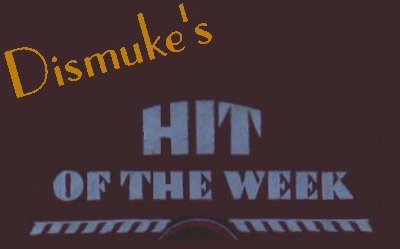

January 2008
January 31
This week's Hit of the Week is brought
to you by
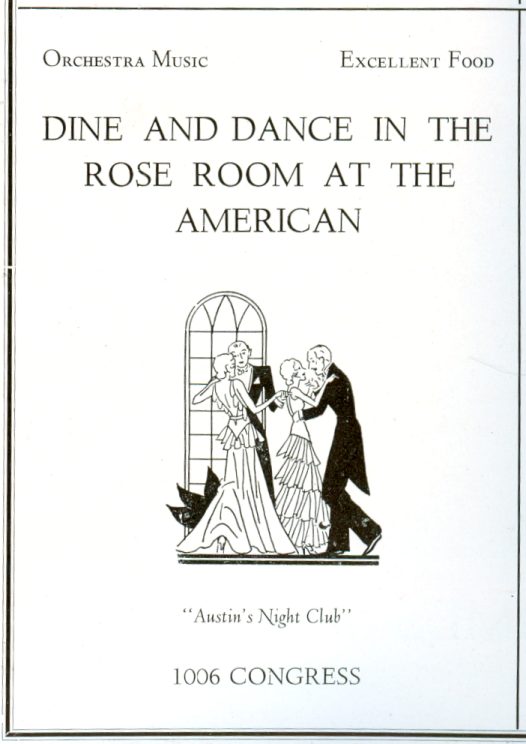
Rose Room
"Austin's Night Club"
Austin, Texas
(from 1931 ad)
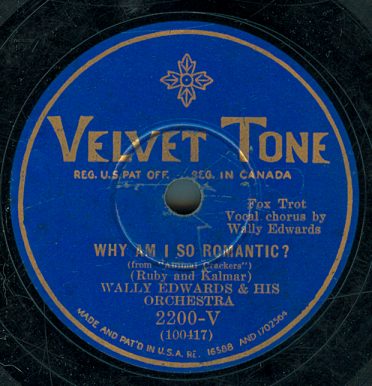
Why
Am I So Romantic
Wally Edwards & His Orchestra
1930
(Velvet Tone 2200 V mx 100417)
Song
Of The Moonbeams
Colonial Club Orchestra
1929
(Brunswick 4452)
African
Lament
Don Carlos & His Rumba Band
1931
(Oriole 2217 B mx 10421)
Here are some selections from 78
rpms that were recently given to me as Christmas gifts from two of my regular
guest contributors.
"Why Am I So Romantic" is one of
several 78 rpms that Eddie The Collector gave me - and of them, this is
my definite favorite. I fell for this one within a few seconds after
I started it up on the turntable - a very charming recording, I think.
The song was introduced by Lillian Roth and Hal Thompson in the 1930 Paramount
film Animal Crackers which starred the Marx Brothers.
"Song Of The Moonbeams" is from
another of the records Eddie gave me. The song comes from Earl Carroll's
1929 musical review Sketch Book. Incorporated within the live
stage show was a talking picture of Eddie Cantor singing a song called
"Legs Legs Legs" after which, according to a July 15, 1929 Time Magazine
review, "a large and lovely group of girls attired in summery yellow dresses
crowd out upon the stage, lie on their backs on an imitation grass terrace,
raise their legs high in the air and wave them slowly to & fro. This
revel sets the pitch for the rest of the entertainment, which fulfills
every standard - anatomical, luxurious, careless - that is associated with
Producer Carroll." According to the same review: "Ray Kavanaugh's
orchestra, which helps to promote such fetching tunes as "Song of the Moonbeams"
and "Kinda Cute," not only rises mechanically from the pit, but moves slowly
back across the stage and is ultimately hoisted high in air to accompany
a hectic first act finale."
The third selection comes from a
record that was given to me as a Christmas gift by Matt From College Station
- and receiving it came as quite a surprise. A few weeks earlier,
I was on the phone with Matt and mentioned seeing the record for sale online.
I was curious about the record as I very much enjoy the Don Azpiazu and
His Royal Havana Casino Orchestra version of the song that I featured on
the March 29, 2007 update. I figured
that the Don Carlos version was probably the dime store budget label version
issued in response to Victor's release of the Aspiazu version and was interested
in seeing how the two versions would compare. I mentioned to Matt
that I was thinking of buying the record. At the time, things
were extremely busy for me and it was several days before I thought about
the record again and remembered to contact the seller - and when I did
I was told it had already been sold. I kind of kicked myself for
being so negligent about following up on the record, especially since it
is hard to tell when I might come across another copy. So it
was a very nice surprise on Christmas morning when I opened up the box
that Matt had shipped to me and saw the record. This version
is very different than the Don Aspiazu version - but it, too, is quite
nice, I think. Don Carlos and His Rumba band was a pseudonym
given to recordings of several bands including the Lou Gold and Vincent
Rose bands. This particular recording is by the Justin Ring Orchestra
and was issued both on the Oriole and Perfect labels. This copy is
on Oriole which means that it was sold at one of the dime stores in the
McCrory chain. In other instances, imported British recordings were
issued under the Don Carlos pseudonym.
- Dismuke
EXTRA
This section will present
78 rpm recordings that do not fall within the range of the vintage pop
and jazz fare that I usually present. Here I will feature
recordings from a wide variety of eras, musical genres and nationalities
as well as occasional spoken word recordings.
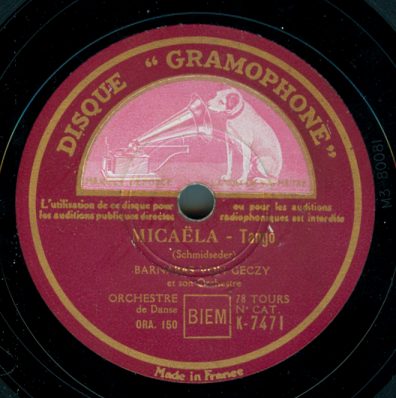
Car
C’est Toi Que J’aime (Weil ich dich verehre)
Barnabas Von Geczy et son Orchestre
1934
(Disque Gramophone K 7471 mx ORA
151)
Micaela
Barnabas Von Geczy et son Orchestre
1934
(Disque Grammophone K 7471 mx ORA
150)
While one usually associates tangos
with Argentina and South America, during the late 1920s and early 1930s
the tango was enormously popular in Germany. Here are two very nice
examples of German tango recordings. Barnabas Von Geczy was a Hungarian
born violinist who led a very popular German hotel band which also toured
and performed on radio broadcasts. Much of the Von Geczy's
recordings fall into the "salon music" genre but the orchestra also played
popular dance and tango music as well.
Both of these selections were recorded
in Germany and issued on the Electrola label. My copy, however,
is on a Disque Gramophone pressing for the French market - and for that
reason, the label credits are given in French and not German.
- Dismuke
January 17
This week's Hit of the Week is brought
to you by
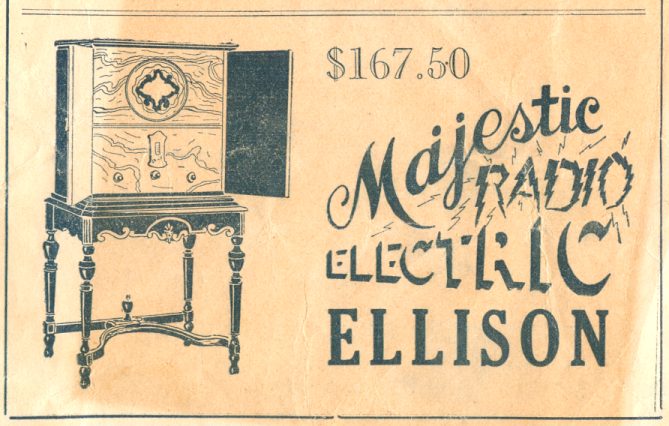
Majestic Radio
Ellision Furniture & Carpet
Co.
Fort Worth, Texas
(from 1928 ad)
Bad
Girl
Paul Mills And His Merry Makers
1928
(Romeo 804 - mx 3430)
Sweethearts
On Parade
Bob Haring And His Orchestra
1928
(Romeo 804 mx 3474)
Here is a record that I have had
in my collection for a while. However, since my copy was in horrible
condition, it was on my "wish list" for an upgrade for several years.
Happily, I was recently able to at last find a copy in better shape.
Unfortunately, even with a copy in decent condition, the quality of the
recordings themselves is not so great even for the time period.
This record was issued simultaneously on Cameo and two of its subsidiary
labels, Lincoln and Romeo. Cameo was a budget label and there is
a very noticeable difference in the recording fidelity between most of
that company's issues and those of premium labels such as Columbia or Victor.
This pressing is on Romeo which was mostly distributed through the Kress
dime store chain.
"Bad Girl" is a song that I think
is rather catchy and one that does not seem to have been very successful
commercially. Other recordings of the song may have been made
but I have yet to find any reference to one. The song's lyrics
were certainly written by a successful individual, Mitchell Parish, who
was also responsible for the lyrics to such enduring songs as "Stardust"
"Moonlight Serenade" and "Louisiana Fairy Tale." The label credits
Jeanne Gravelle as the song's composer. I have not been able to locate
any information about Gravelle - but I did run across something online
which suggests that Gravelle MIGHT have perhaps been a pseudonym
for bandleader Bob Haring.
The band on the recording, Paul
Mills and His Merry Makers, was a recording group put together by Irving
Mills, the famous music publisher and impresario who discovered and promoted
a number of famous musical acts including Duke Ellington and Cab
Calloway.
"Sweethearts On Parade" was composed
in 1928 by Carmen Lombardo with lyrics by Charles Newman. Guy Lombardo
and His Royal Canadians had a successful recording of it as did Louis Armstrong.
In 1930, the song was used as the title song of the film Sweethearts
On Parade.
- Dismuke
EXTRA
This section will present
78 rpm recordings that do not fall within the range of the vintage pop
and jazz fare that I usually present. Here I will feature
recordings from a wide variety of eras, musical genres and nationalities
as well as occasional spoken word recordings.
Elube
Chango
Sacasas Royal Havana Orchestra
Doroteo Santiago, vocal
1940
(Decca 3377 B mx 67988)
The
Breeze And I
Sacasas Royal Havana Orchestra
1940
(Decca 3377 A mx 67986)
I consider myself to be a fan of
the Cuban big bands of the 1930s and 1940s - especially the rumba recordings.
Many recordings by such bands were very beautiful and haunting.
I especially enjoy the rich orchestration on the second half of both of
these recordings.
Anselmo Sacasas was a Cuban pianist
who, in 1937 along with vocalist Miguelito Valdés, founded the Casino
de la Playa Orchestra which became one of Cuba's most highly regarded bands.
Despite the band's success, Sacasas was unhappy during his three year association
with it. The band was organized as a cooperative and Sacasas felt
that he was poorly compensated for the amount of time and work he devoted
to it. In 1940, he and Valdés left the band and came
to the United States. Valdés accepted a position with the
Xavier Cugat band and eventually went on to a very successful solo career.
Sacasas formed a new band which opened at the Colony Club in Chicago.
He continued to lead Latin style bands throughout the '40s and '50s.
In 1959 he became the music director at the Fontainebleau Hotel in Miami
and, in 1963, the music director at the Club Tropicoro at the El San Juan
Hotel & Casino in Puerto Rico. He retired from the music business
in 1976.
I don't have much background information
on "Elube Chango" other than it was composed by Alberto Rivera and was
recorded by a number of Latin bands.
"The Breeze and I" is an adaptation
of a 1927 piano piece called "Andaluza" which was part of the "Andalucia
Suite" by Cuban composer/musician Ernesto Lecuona. In 1940,
Salvador "Toots" Camarata, a trumpet player and arranger for the Jimmy
Dorsey Orchestra, reworked the song with lyrics by Al Stillman as "The
Breeze And I." Dorsey's recording of the song was very successful
rising up to the number 2 position on the Billboard charts.
Xavier Cugat also had a successful recording of the song.
- Dismuke
January 10
This week's Hit of the Week is brought
to you by
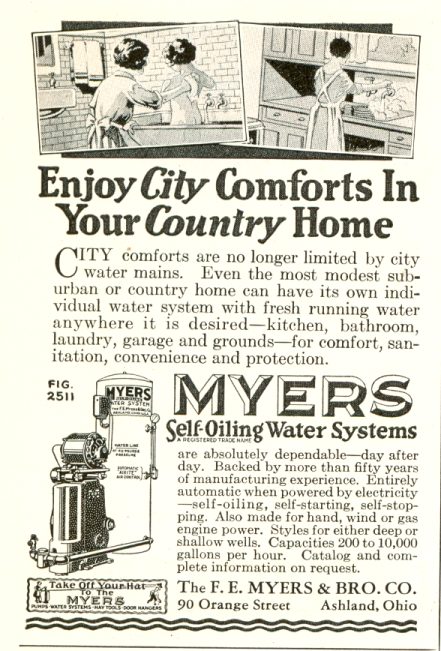
Enjoy City Comforts in Your Country Home
MYERS
Self-Oiling Water Systems
(from 1929 ad)
Every
Day Away From You
Bernie Cummins And His Biltmore Orchestra
Bernie Cummins, vocal
1929
(Victor 22088-B)
Little
By Little
Bernie Cummins And His Biltmore Orchestra
Bernie Cummins, vocal
1929
(Victor 22088-A)
Bernie Cummins was one of many popular
bandleaders from the early 20th century who has been all but forgotten
- this despite the fact that he had a successful career as a bandleader
spanning 40 years between 1919 and 1959. Musical styles changed
dramatically and rapidly during that period and one of the ways Cummins
was able to enjoy such a lengthy run was to change with them.
Therefore, as with most bandleaders from those decades, the style of his
recordings can fluctuate significantly depending on when they were made.
At the time these sides were made, the Cummins band had a successful engagement
at New York's Biltmore Hotel. By January 1930, however, the
billing on his records indicates that the band had moved to the brand new
Hotel
New Yorker where it was to enjoy a long stay.
Both of these selections, which
feature Cummins himself on the vocal, were recorded in New York City on
August 14, 1929. "Every Day Away From You" was composed by Jay Mills
and has lyrics by Charles Tobias. "Little By Little" is a Walter
O'Keefe - Bobby Dolan song which was introduced in the 1929 Pathe film
The
Sophomore. The film was released in theaters ten days after this
recording session took place. The timing makes sense - Victor needed
a certain amount of lead time in order to make recordings available for
those in the film's audience who enjoyed the song
- Dismuke
EXTRA
This section will present
78 rpm recordings that do not fall within the range of the vintage pop
and jazz fare that I usually present. Here I will feature
recordings from a wide variety of eras, musical genres and nationalities
as well as occasional spoken word recordings.
Roses
Magiques
Edith Lorand et son Orchestre
circa 1928 - 1933
(Parlophone 80 182 mx 36680)
Serenade
No 1 (Drdla)
Edith Lorand Orchester
1928
(Parlophon P 9376 1 mx 21042)
Edith Lorand was a Hungarian born
violinist who led a German-based salon orchestra. Her orchestra was one
of Europe's most popular salon orchestras until the rise of the National
Socialists resulted in her record contract not being renewed and theatre
owners being afraid to allow her to perform. In 1934 she fled
to her native Hungary but that country's government soon fell under German
influence. She eventually fled to America where she continued to
perform but without the level of popular recognition she enjoyed in Europe.
"Roses Magiques" is a very charming
waltz from Dutch composer Arthur Von Oost. I have not been able to
find much information about Van Oost other than he lived from 1870 - 1942
and was the composer of a 1912 operetta Les Moulins Qui Chantent
"Serenade No 1" was composed in
1901 by Frantisek Drdla, also known as Franz Drdla, who was a Czech composer
and violinist. Shortly after I digitalized this selection,
I acquired another recording of Drdla's "Serenade" on the rare pre-World
War I Symphony Concert label which imported classical recordings made in
Germany to the American market. On the Symphony Concert issue the
song is billed as "Kubeliks Serenade." My assumption is "Kubeliks"
is a reference to another famous Czech violinist, Jan Kubelík, who
did make a recording of Drdla's "Serenade"on the Italian Fonotopia label.
Other than the fact that Kubelík made the Fonotopia recording, I
have not been able to find any mention as to why record buyers would specifically
associate the song with him. At some point, I will probably
feature the Symphony Concert recording on a future update as it is also
a nice recording. And I have recently acquired a number of
other Edith Lorand records which I will eventually feature.
Update: A reader was kind
enough to write in with the following information:
"Jan Kubelik (father of famed
Maestro Raphael Kubelik) was a friend of Franz Drdla and a very great concert
violinist. Drdla dedicated his Serenade to Jan Kubelik and it became Kubelik's
theme song. He played it constantly during his concert tours in Europe
and the U.S. Incidently, Kubelik's accompanist during his early 20th century
American tours was a young pianist named Rudolf Friml who decided to remain
in America and became the celebrated Friml. The Serenade was so much identified
with Kubelik that it became known also under the title Kubelik Serenade.
Franz Drdla spent most of his life in Vienna and New York and is still
remembered for another famous tune called Souvenir. "
- Dismuke

|


